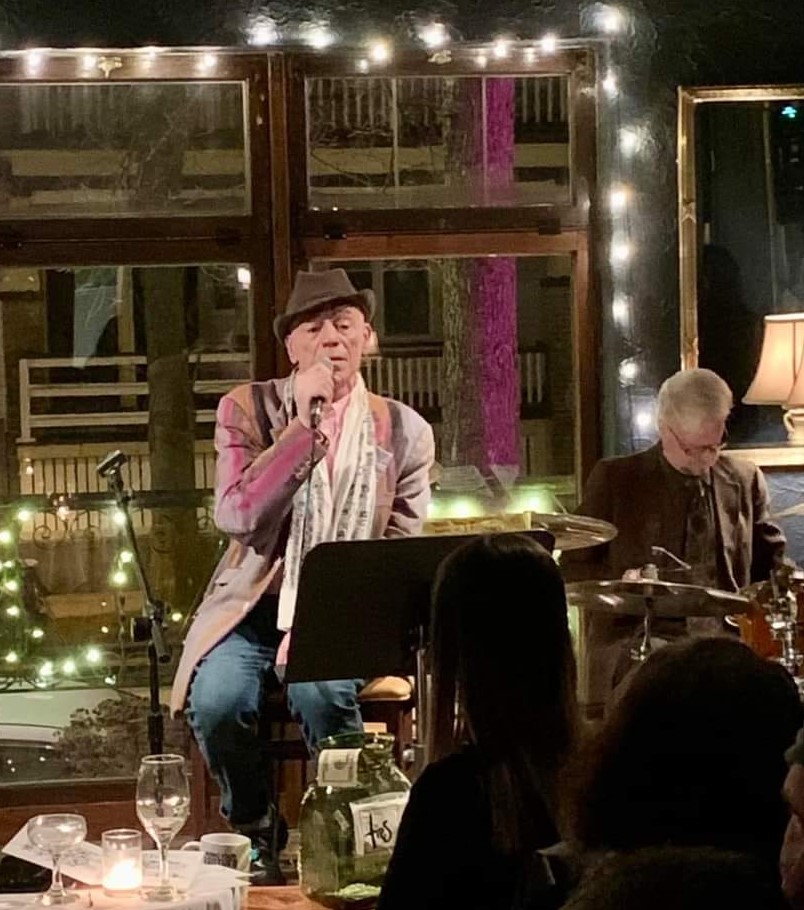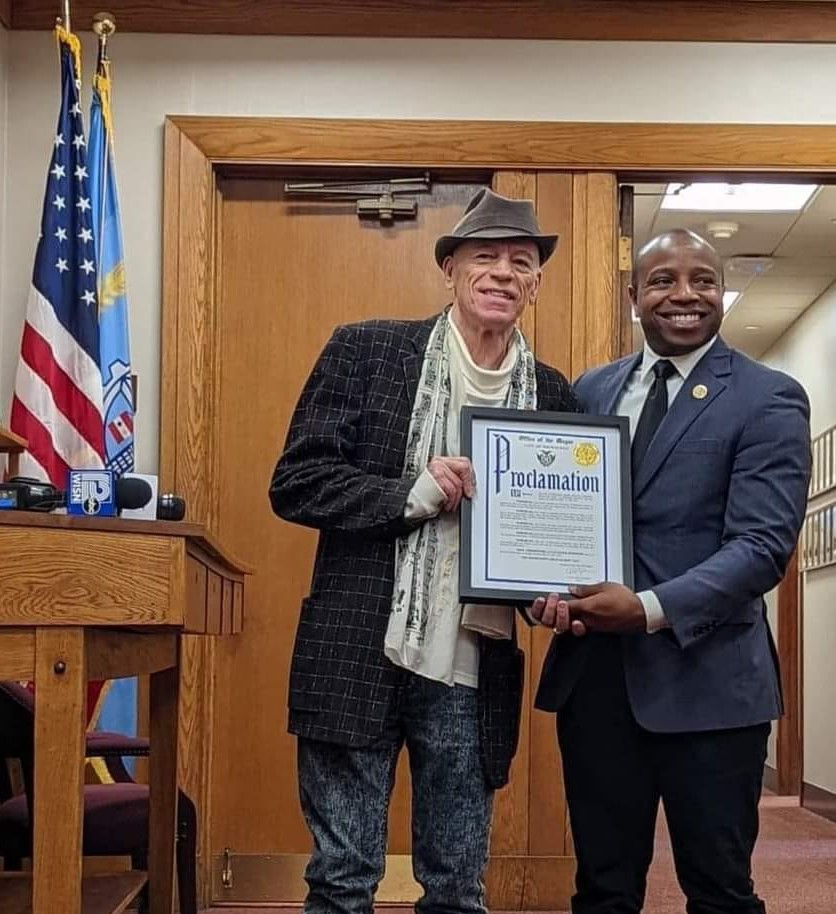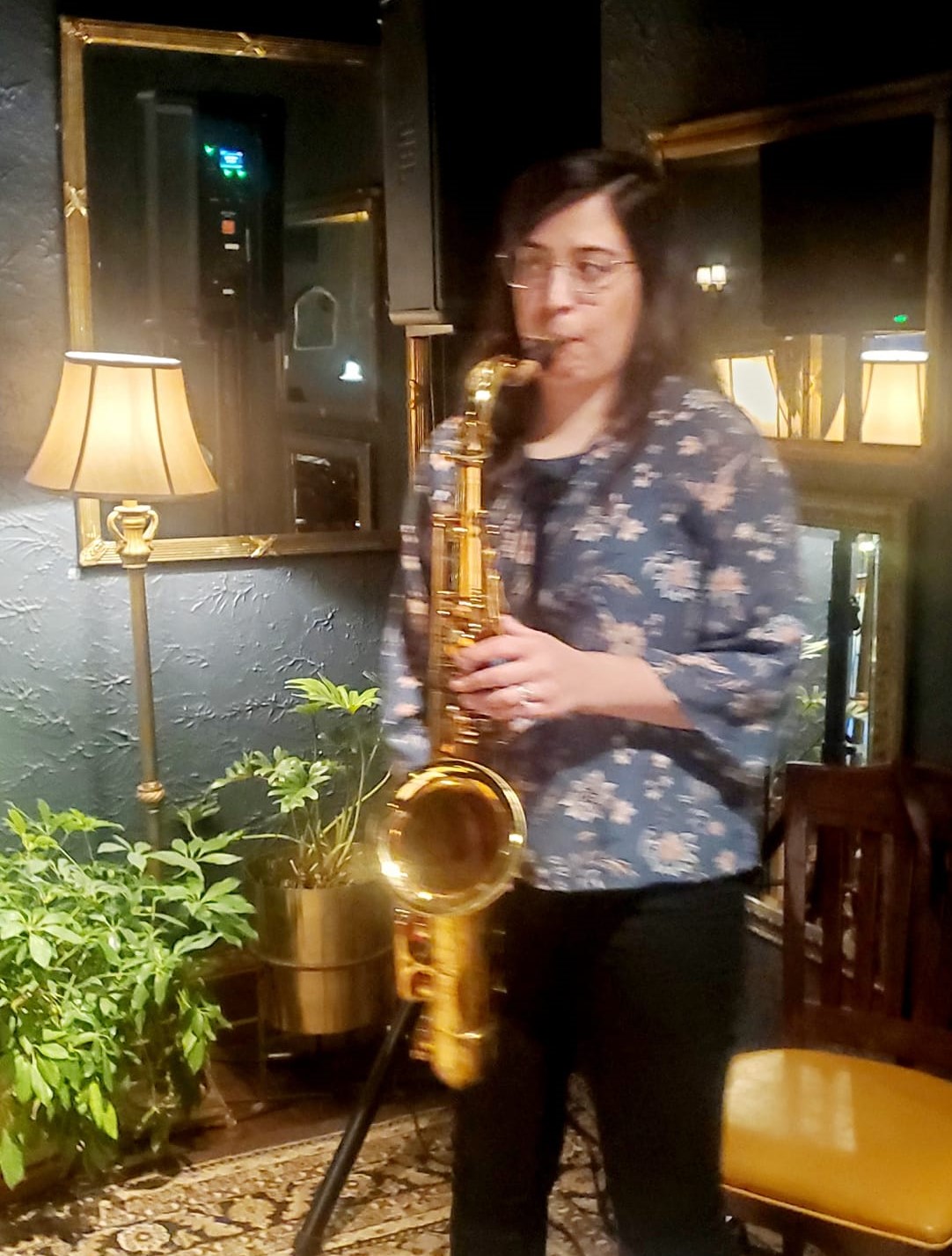
Singer Jerry Grillo performs at his “Decades Tour” celebrating his 80th Birthday at Bar Centro on Feb. 10, with drummer Randy Maio, at right. Photos courtesy Jerry Grillo.
A notable recent performance by Milwaukee jazz singer Jerry Grillo got me thinking about his art form, partly due to technical difficulties with my blog delaying me from writing an intended review. Then today, while exercising, I listened to one of the most acclaimed male jazz singers today, Gregory Porter.
So, I hope I’m doing Grillo a service by partly comparing him to the highest standards of his craft. Grillo may be nearing the end of his performing career as he chose to do a sort of career and life retrospective on his “Decades Tour,” celebrating his 80th birthday at Bar Centro in Milwaukee’s Riverwest neighborhood. The joint was filled beyond capacity, suggesting a cultivated popularity, which leads to an implicit question. Doesn’t the art of male jazz singing remain too rare, both nationally and locally? General audiences seem more attracted to female singers, who might be more easily marketed as well, whether singing jazz, or classical, or even pop, now that male singers fronting male rock bands have now given way to superstar female pop singers, the biggest which need not be named.
Thus, it seems all more valuable to appreciate men willing to open themselves up to the emotional and artistic vulnerabilities of singing, more typically the province of women. To this point, this man’s songs at Bar Centro included several made famous by women, including Judy Garland, Barbra Streisand, Dinah Washington, and Morgana King.
So, I celebrate Grillo’s accomplishment by possibly holding him to high standards. His voice may not possess the pure resonant quality of a Gregory Porter, or of a Kurt Elling, or the textural richness or quite the capacious dynamic range of his “favorite singer,” Tony Bennett.
Yet Grillo has plenty to offer as a narrative and dramatic master of his material, a musical raconteur, and as an improvisational risk-taker in the tradition of real jazz, by contrast to a safer singer guided by jazz musicians. He demonstrated this by performing songs that he conceded weren’t typical jazz material; he mastered jazz singing only in his career’s latter portion, since the 1990s. But these songs were sung his way. His roots actually lie in musical theater as he demonstrated here. His choice of material is consistently witty and engaging. He also took liberty to introduce each song with its context in his own life, thus personalizing it as a storyteller.
The first, “Teach Me Tonight” served as a way to learn about him and, with its sly pivot toward boudoir instruction, as a rich metaphor for the man himself as a true artistic Romantic, and as a teacher, which he was for many years. This began his biographical commentary: we learned he was born in Hibbing, Minnesota, not coincidentally the birthplace of Bob Dylan. He’s hardly the poetic songwriter that Dylan is (who is, really?), but Grillo, akin to Dylan, accomplishes so much both with a less-than-perfect voice and the creative chutzpah to virtually reinvent his songs almost every time he sings them.
So no, Grillo’s singing may not be as purely pleasing as, say, Porter’s. But that celebrated Blue Note recording artist tends to lean heavily on the warm, glowing tones of his resonant baritone, in many medium-to-slow songs.
By contrast, Grillo not infrequently finds himself in precarious pivots of intonation – because he’s taking musical risks, trying to modulate his singing to the twists and turns of a jazz song’s tricky chord changes, without being calculated. Thus, he seems more authentic, honest, vulnerable, and quite appealing as a musical human. He can also render a tender ballad, like the hush of “A Quiet Thing,” made famous by Morgana King. This managed to fairly tame the rather boisterous chatterers at the bar, a sort of spell-casting.
Now, with his audience’s full attention, he rewarded with them shortly with his most acclaimed song, “My Hometown, Milwaukee,” which he wrote. As he explained, it celebrates his adopted hometown by avoiding clichés like cheese and beer, instead exulting in our extraordinary “museum with wings,” our somewhat unique public transit bus The Hop, and our pro sports teams: “The Bucks are the tops! And the Brewers will win the World Series…next year.” His pause, and pitch drop, were perfect comedian’s timing, deflating his own claim, and drawing laughter from a crowd that surely would relish the always-game Brewers finally winning it all.
“My Hometown” is a declamatory romp, which leads to a big-chested, strutting climax, akin to Sinatra singing “Chicago.” The song earned him a proclamation from Mayor Cavalier Johnson of “My Hometown, Milwaukee” Day, last May. It also won the 2023 WAMI award for “Most Unique Song.”

Jerry Grillo and Milwaukee Mayor Cavalier Johnson hold the Mayoral Proclamation of “My Hometown, Milwaukee” Day last May, honoring Grillo’s song, which also won a 2023 WAMI Award.
In the second set, Grillo wisely noted that jazz is essentially a “black art form,” by performing Fats Waller’s “Ain’t Misbehavin’.” It’s hardly black protest or identity-assertion, but illustrates of how American black music grew by merging foot-tapping entertainment with insouciant, smart creativity.
He somewhat book-ended his program by honoring, early in the first set, his favorite singer Tony Bennett, with “I Wanna be Around” and, as the penultimate song, Bennett’s trademark “San Francisco.” Preceding that was one of the most poignant moments. Another pianist friend, Rose Fosco, had composed a tune she called “Lonely” which, he explained, was written for her late father, a delicately-crafted expression of her sense of loss. Grillo set it to lyrics, and it served also for him as an acknowledgment of mortality as did, in more affirmative terms, the program closer, “You’ll Never Walk Alone.” Grillo was implicity looking in the mirror of time.
Sensitive accompaniment shadowed the singer throughout: pianist John Hefter, drummer Randy Maio and especially saxophonist Jeanne Marie Farinelli, who added a limpid flute solo to that final tune.

Saxophonist-flutist Jeanne Marie Farinelli performs with Grillo at Bar Centro.
This evening breathed in long waves of anecdote and songful ardor, it chuckled, digressed and grew increasingly palpable of a creative man’s love affair with a city. That added up to what felt like a precious gift from the vocalist to his audience. Grillo will continue his “Decades Tour” indefinitely, ever hopeful. Then, perhaps he’ll saunter off into the sunset.
However his final performance chapter plays out, let us give thanks and always cherish Milwaukee’s preeminent hometown male jazz singer.
_____________

